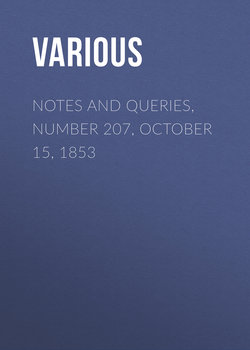Notes and Queries, Number 207, October 15, 1853

Реклама. ООО «ЛитРес», ИНН: 7719571260.
Оглавление
Various. Notes and Queries, Number 207, October 15, 1853
Notes
Notes on Midland County Minstrelsy
COMET SUPERSTITIONS IN 1853
THE OLD ENGLISH WORD "BELIKE."
DRUSES
FOLK LORE
SHAKSPEARE CORRESPONDENCE
DEATH ON THE FINGERS
Minor Notes
Queries
LOVETT OF ASTWELL
OATHS
THE ELECTRIC TELEGRAPH
Minor Queries
Minor Queries with Answers
Replies
PORTRAITS OF HOBBES AND LETTERS OF HOLLAR
PAROCHIAL LIBRARIES
BATTLE OF VILLERS EN COUCHÉ
ATTAINMENT OF MAJORITY
SIMILARITY OF IDEA IN ST. LUKE AND JUVENAL
PHOTOGRAPHIC CORRESPONDENCE
Replies to Minor Queries
Miscellaneous
BOOKS AND ODD VOLUMES WANTED TO PURCHASE
Notices to Correspondents
WESTERN LIFE ASSURANCE AND ANNUITY SOCIETY
ARCHÆOLOGICAL WORKS. BY. JOHN YONGE AKERMAN,
MURRAY'S HANDBOOKS FOR TRAVELLERS IN ITALY
Отрывок из книги
It has often occurred to me that the old country folk-songs are as worthy of a niche in your mausoleum as the more prosy lore to which you allot a separate division. Why does not some one write a Minstrelsy of the Midland Counties? There is ample material to work upon, and not yet spoiled by dry-as-dust-ism. It would be vain, perhaps, to emulate the achievements of the Scottish antiquary; but surely something might be done better than the county Garlands, which, with a few honorable exceptions, are sad abortions, mere channels for rhyme-struck editors. There is one peculiarity of the midland songs and ballads which I do not remember to have seen noticed, viz. their singular affinity to those of Scotland, as exhibited in the collections of Scott and Motherwell. I have repeatedly noticed this, even so far south as Gloucestershire. Of the old Staffordshire ballad which appeared in your columns some months ago, I remember to have heard two distinct versions in Warwickshire, all approaching more or less to the Scottish type:
Now whence this curious similarity in the vernacular ideology of districts so remote? Are all the versions from one original, distributed by the wandering minstrels, and in course of time adapted to new localities and dialects? and, if so, whence came the original, from England or Scotland? Here is a nut for Dr. Rimbault, or some of your other correspondents learned in popular poetry. Another instance also occurs to me. Most of your readers are doubtless familiar with the pretty little ballad of "Lady Anne" in the Border Minstrelsy, which relates so plaintively the murder of the two innocent babes, and the ghostly retribution to the guilty mother. Other versions are given by Kinloch in his Ancient Scottish Ballads, and by Buchan in the Songs of the North, the former laying the scene in London:
.....
We thus see that the radical meaning of the word belike is to lie or be near, to attend; from which it came to express the simple condition, or state of a thing: and it is in this latter sense that the word is used as an adverbial or rather an interjectional expression, when it may be rendered, it may be so, so it is, is it so, &c. Sometimes ironically, sometimes expressing chance, &c.; in the course of time it became superseded by the more modern term perhaps. Instances of similar elliptical expressions are common at the present day, and will readily suggest themselves: the modern please, used for entreaty, is analogous.
It is not a little singular that this account of the word belike enables us to understand a passage in Macbeth, which has been unintelligible to all the commentators and readers of Shakspeare down to the present day. I allude to the following, which stands in my first folio, Act IV. Sc. 3., thus:
.....